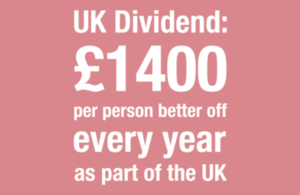UK government’s ‘Project Fact’ enters final phase
Government publishes conclusions of its Scotland Analysis programme.

UK dividend £1400 per person better off every year as part of the UK
The UK government today (19 June 2014) publishes the conclusions of the most rigorous and comprehensive analysis of Scotland’s place in the UK ever undertaken.
‘United Kingdom, united future: Conclusions of the Scotland analysis programme’ summarises over 1,400 pages of analysis, the opinions of hundreds of independent experts and organisations on what a separate Scotland would mean for individuals, businesses and other organisations.
The paper brings together the UK government’s key findings on currency, businesses and jobs, the affordability of public services, personal finances, and Scotland’s place in the world into just over 50 pages.
The findings will be shared directly with people in Scotland through the UK government’s public information campaign, with a booklet going to every home in Scotland from next week.
From the outset of the Scottish referendum debate the UK government has set out to inform voters in Scotland. Voting to stay as part of the UK or for a separate Scotland is the most important decision any Scottish voter will ever make.
The Scotland analysis programme has been designed to provide the facts every Scot needs to know before the referendum.
It has included:
- 1,400 pages of analysis compared to one page of costings in the Scottish government’s White Paper
- fiscal projections over 20 years based on independent forecasts, rather than the Scottish government’s optimistic internal forecasts for just one year
- costed policies, rather than the Scottish government’s unfunded commitments
- rigorous analysis of the currency options for a separate Scotland, showing that none of the alternatives would work as well as using the pound as part of the UK
Today’s paper concludes:
As part of the UK Scotland has the best of both worlds:
With a strong Scottish Parliament, Scotland can make its own decisions in devolved areas, while sharing risks and resources with the other parts of the UK. More than 200 UK public institutions serve people in Scotland, underpinned by shared principles and values. If Scotland votes for independence this will come to an end. Scotland will leave the UK and become a new, separate state.
As part of the UK Scotland has all the advantages of the pound:
Scotland is currently an important member of one of the oldest and most stable currencies in the world, supported by the UK’s strong political union. It would not be possible to recreate today’s arrangements if that political union did not exist. That is why all three of the largest political parties in the UK have ruled out sharing the pound or the Bank of England in a formal currency union.
As part of the UK Scotland has lower taxes and higher public spending:
A great weight of evidence says that Scotland’s finances are stronger as part of the UK. Independent experts agree that the UK offers people in Scotland lower taxes and higher public spending than would be possible in an independent Scotland. HM Treasury estimates that this is worth £1,400 per year for each person in Scotland, this is called the UK Dividend. The government of an independent Scotland would exercise additional responsibilities, but it would also have to choose whether to raise taxes, or cut public services, or both.
Chief Secretary to the Treasury, Danny Alexander, said:
People need to be informed about the consequences of the Scottish referendum. That’s why we have undertaken the most rigorous and comprehensive analysis of Scotland’s place in the UK ever attempted. You might call it ‘Project Fact’ - over 1,400 pages of analysis citing hundreds of independent experts and organisations.
The conclusion is clear: almost every aspect of life in Scotland is enhanced and improved because we are part of the UK.
That’s why we will share these conclusions with people in Scotland through the UK government’s public information campaign, with a booklet going to every home in Scotland over the next few months.